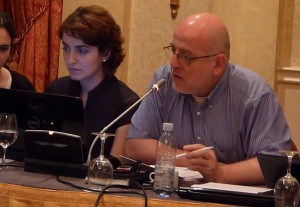
TBILISI, DFWatch – After a series of incidents with security and police, journalists gathered in Tbilisi to share their stories and inform foreign diplomats.
Association of Regional Broadcasters had prepared a documentary based on material from regional reporters. The problems they are facing are being thrown out when the government organizes meetings with the public, damaging of equipment, erasing or removing memory cards, as well as physical and verbal abuse.
Saba Tsitsikashvili, editor of Kartlis Khma, told at a meeting Friday in Tbilisi Marriott Hotel how a few days ago, the Interior Minister held a meeting with teachers in a hall with 600 people. He was forced out of the hall by persons dressed in civilian clothes. Then he tried to ask the minister what connection he had with those teachers, but the guard grabbed the lens of his camera, showing his teeth offensively.
Irakli Vachiberidze, a journalist with the newspaper P.S., says that the president’s spokesperson told journalists that no journalist will be allowed to report on the meeting with the president except journalists from the national channels Rustavi 2, Imedi and Channel One.
“You newspaper journalists sit down in front of the television and watch what these journalists broadcast.”
He also remembers an incident when another journalist from P.S. was blackmailed that if he reported critically on the regional governor of Imereti, then they would get his father fired.
A short documentary showed footage from a hidden camera of a journalist who is arguing with a policeman. There is parade in the street and the incident takes place at the office of a media outlet. The office is a perfect location for observing the parade.
The policeman enters the office and prohibits the journalists from taking videos or photos without showing any order and demands a permit for shooting video.
A representative of the regional online newspaper TSPress remembered a number of stories of its journalists having their rights violated recently. One of them was thrown out of a public building and her equipment and hand bag was dropped on the ground.
She also spoke about an incident when a journalist from Channel 1 hit the microphone on the camera of a TSPress journalists, saying ‘how he dared standing next to Imedi’s journalist.’
Zviad Koridze, media expert and member of Coalition for Freedom of Choice says considering that what the national broadcasters are taking part in is nothing less than propaganda, the only thing which disturbs them is local media.
“That’s why they became objects of attack. The government wants to scare journalists, to lower their qualification, to make them censor themselves, so journalists do not do what the government doesn’t like them to.”
Natia Kapanadze, a lawyer who works with journalists’ rights at Georgian Young Lawyers’ Association, says that one of the main problems is that incidents aren’t investigated, and among those that get as far as to a trial, 90 per cent end with a decision against the claimant, she says.
Natia Kuprashvili from Association of Regional Broadcasting spoke about problems the media are having in regions Georgia outside of Tbilisi. She says that many regional TV reporters have resigned since there appeared a new player in the TV sphere in Georgia; Channel 9, run by the opposition movement led by Bidzina Ivasnihvili. She says that regional media is not very sustainable; they do not have good salaries, so journalists decided to leave. It’s not a question of competition but a question of good conditions.
The activity in media organizations, no matter who owns them, is mostly dependent on individuals and journalists, she added.
Another primary problem in regional media is that at the end of 2011, the Communication Commission demanded that license tax is paid for ten years at a time.
“Actually, it was in frames of law,” Kuprashvili says, but it caused huge problems for regional broadcasters. “They have to pay an amount to the commission which is more than their monthly income.”
The fact that regional broadcasters don’t have many political or other commercials doubles their trouble.

